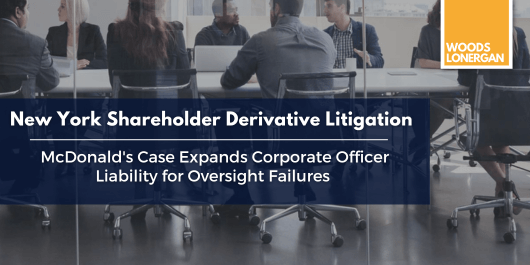How the McDonald’s Corp. Shareholder Derivative Litigation Could Reshape New York Corporate Law

A landmark ruling from the Delaware Court of Chancery has sent shockwaves through the corporate world, establishing for the first time that corporate officers, not just directors, owe a legal duty of oversight to their companies.
The case, In re McDonald’s Corp. S’holder Deriv. Litig., Case No. 2023-0103 (Del. Ch. 2023), sets a significant precedent that will undoubtedly influence corporate governance and fiduciary duty law in New York and beyond.
Our experienced New York City corporate litigation lawyers will explain.
Background of the McDonald’s Case
This pivotal case, filed in April 2021, involved shareholders bringing a derivative action against McDonald’s corporate officers, alleging breaches of fiduciary duty under the Caremark framework.
On March 1, 2023, in In re McDonald’s Corporation Stockholder Derivative Litigation, Vice Chancellor Travis Laster of Delaware’s Court of Chancery granted a motion to dismiss derivative claims against McDonald’s directors relating to their alleged failure to address sexual harassment issues at the company.
The decision follows a prior ruling in the same derivative lawsuit on January 25, 2023, which represented the first Delaware decision expressly holding that corporate oversight duties under In re Caremark Int’l Inc. Derivative Litig., 698 A.2d 959 (Del. Ch. 1996), apply to directors, as well as officers.
At the heart of the allegations was the failure to implement adequate monitoring systems and the disregard of significant compliance issues, particularly concerning sexual harassment within the company.
This case serves as a stark reminder of the heightened compliance reporting stakes in high-risk sectors like food service, pharmaceuticals, and aviation, where regulatory scrutiny and potential liabilities are particularly stringent.
David Fairhurst, McDonald’s Executive Vice President and Global Chief People Officer from 2015 to 2019, was at the center of the allegations. Fairhurst himself faced accusations of personal misconduct, including sexual harassment, which contributed to his termination in 2019.
While these allegations were not the primary focus of the derivative lawsuit, they further underscored the pervasive issues within the company’s culture and leadership. Shareholders claimed Fairhurst ignored glaring red flags regarding sexual harassment and misconduct, actions the court deemed a breach of his fiduciary duties, allowing the lawsuit to proceed to trial.
Key Takeaways for Corporate Board Members: Identify All Central Compliance Risks Facing the Business, Not Just Risks That Might Be Considered Mission Critical
- Extension of Oversight Duties to Officers: The ruling significantly broadens liability by holding corporate officers, not just directors, accountable for oversight failures. This expansion of the duty of oversight under Caremark claims means that officers can now be held personally liable for failures within their specific areas of responsibility, increasing the potential defendants in shareholder derivative actions.
- Clarification of Oversight Responsibilities: The court clarified that an officer’s duty of oversight is confined to their area of authority. For instance, a Chief Financial Officer (CFO) is responsible for financial oversight, while a Chief Legal Officer (CLO) oversees legal matters.
- Importance of Adequate Monitoring Systems: The ruling emphasizes the necessity for companies to establish robust internal monitoring and reporting systems to ensure compliance and good governance. Effective systems guarantee that timely and relevant information reaches the board, enabling proactive management of potential issues.
- Responding to Red Flags: Officers must actively address compliance issues and cannot turn a blind eye to red flags. Proper documentation and upward reporting of issues are crucial to maintaining transparency and accountability. Failure to do so can lead to legal action and reputational harm.
Practical Steps for Directors and Officers
- Establishing Effective Monitoring Systems: Implement comprehensive compliance programs tailored to your industry and conduct regular audits to ensure systems are functioning effectively and addressing any compliance gaps.
- Record Board Minutes and Board Materials that explicitly refer to the board’s efforts and oversight of these risks.
- Enhancing Board Oversight: Establish dedicated committees for compliance oversight and provide ongoing training for directors and officers on their oversight responsibilities. Addressing compliance issues promptly and transparently is crucial to maintaining trust and accountability. Failure to do so can lead to legal action and reputational harm. At Woods Lonergan PLLC, our experienced New York corporate governance and litigation attorneys provide expert counsel on compliance, shareholder litigation, and regulatory matters. Contact us today for strategic solutions tailored to your business needs.
Insurance Implications for Board Members Facing Liability Claims
Many companies maintain Directors and Officers (D&O) insurance policies that typically cover the monetary liability and costs (including attorneys’ fees) from defending against breach of fiduciary duty claims.
However, a company’s ability to indemnify directors and officers may be limited by statute. For example, the company may not be able to indemnify directors or officers found liable for bad faith conduct against the company. Companies may choose to advance litigation costs to directors or officers named as defendants in shareholder derivative actions alleging Caremark claims.
However, directors or officers found liable for bad faith conduct may have to repay the advancements to the company. Counsel for defendants and nominal defendants should consult any D&O insurance policy at the outset of the case to understand the particular coverage that the policy provides, policy limits, and the state of formation’s indemnification statute.
Next Steps for the McDonald’s Case
While no damages have been awarded to shareholders yet, the ruling allows the shareholder derivative lawsuit against David Fairhurst to proceed to trial. Any potential damages awarded would be paid to McDonald’s, not directly to shareholders.
These damages could include clawing back Fairhurst’s compensation and damages for harm done to McDonald’s reputation. The amount of any potential damages will be determined at trial.
Implications for New York Corporations and Courts
The McDonald’s ruling sets a new precedent that could significantly impact fiduciary duty claims in New York courts for New York corporations. While Delaware law often serves as persuasive authority, New York courts may now consider adopting similar standards for corporate officer liability in oversight cases.
This could lead to expanded liability for officers and higher standards for compliance and governance within New York corporations.
Directors and officers in New York should reassess their risk management and compliance programs and ensure they are well-versed in their oversight responsibilities to mitigate potential liabilities.
Final Thoughts for Corporate Board Members
The In re McDonald’s Corp. S’holder Deriv. Litig. the case underscores the critical importance of robust corporate governance and compliance practices. By understanding and implementing the lessons learned from this case, board members and corporate officers can better fulfill their fiduciary duties, protect their companies from potential liabilities, and navigate the evolving landscape of corporate law.
In the complex landscape of corporate law, breaches of fiduciary duty, shareholder disputes, and corporate governance issues can pose significant threats to privately held and mid-size businesses. When facing these challenges, seeking experienced legal counsel is crucial to protecting your rights and interests.
At Woods Lonergan PLLC, our experienced New York corporate litigation attorneys have a deep understanding of the intricacies of corporate law and a proven track record in handling complex shareholder derivative actions, breach of fiduciary duty claims, and other corporate disputes for privately held and mid-size companies.
We leverage our expertise and experience across a wide range of industries and sectors to provide effective solutions tailored to your specific needs.
If you are a board member, corporate officer, or shareholder facing corporate governance challenges or potential litigation in New York, reach out to the attorneys at Woods Lonergan PLLC. We are dedicated to helping you navigate these complex issues and achieve the best possible outcome.
Call our offices at (212) 684-2500 or book a consultation online to discuss how we can be of assistance with your legal matters.
Woods Lonergan PLLC represents business owners, boards of directors, and officers in matters of corporate board governance and litigation throughout New York, including Manhattan, Brooklyn, Queens, Bronx, Staten Island, Nassau, Suffolk, and Westchester Counties.
